Oregon put that to rest, and in some ways the screaming seems even louder here as it was there. It was, of course, immediate. So, too, were the pre-emptive calls “not to politicize it” which I don’t disagree with but were pretty blatantly opportunistic (often accompanied by explanations for why this is why no zone needs to be a gun free zone and a sudden and disingenuous concern for mental health). I’ve past the point where I am inclined to tut-tut about politicizing it. I would prefer that we wait at least 24 hours to absorb what happened and learn what actually happened, but that’s too much to ask for.
Pro gun control people have lost all patience with the “Don’t politicize” argument, and I can actually understand where they’re coming from. As said, a lot of it is opportunistic. Just push back the talk date until the next shooting happens, then push back the talk date again, all the while talking about (or having surrogates talk about) the need for concealed and open carry. I will confess at one point my beliefs about taste and decorum may have been influenced by political self-interest. But after Newtown, I have been convinced that it is indeed an ineffective strategy and even possibly a counterproductive one for gun control advocates… and I still wish they wouldn’t do it. There may still be self-interest involved, but of the more personal self-interest of curiously not liking to be called pro-massacre and a desire after each and every tragedy not to end up in proverbial screaming matches with my friends. But as far as moving the needle is concerned, they seem destined to lose and I consider that a good thing because they deserve to lose.Being on the anti-gun control side of the argument in discussions like this is a case of trying to hit a moving target. Informed from the start that we can’t even pretend to care about this blood and death unless we are on board with their program. But when you point out that the proposed gun control measures would likely have no effect on the incident in question, you’re told that it isn’t actually about this blood and death – this blood and death that absolutely necessitates that we must argue about this before the facts are in and the bodies are cold – is not the point. It’s about shootings in general.
Except that almost none of the mass shootings that make the headlines are particularly vulnerable to gun control. They’re typically people that have their guns legally, or people capable of bypassing all but the most restrictive anti-gun laws. If moderate gun control has an effect, it’s in reducing crimes of passion, crimes of opportunity, and various shades of manslaughter caused more by recklessness than ill-intent but leaving innocent people dead all the same. And suicides. I’m not going to commit to moderate gun control having any positive effect in reducing gun crimes (though I would suicides and accidental deaths), but this is a misdirection.It’s a misdirection that seems to be born in a theory that isn’t bearing out. The idea, at some point, was that nobody will support gun control to save the lives of urban minority youths in Chicago. But if you use cases where the victims are white, then they will take notice. This seemed to almost work in the 90’s, but it’s a script that gun supporters just aren’t playing their part in. And I think that’s frustrating their opposition.
Especially frustrating to well-intentioned people on all sides is this: This is a subject on which there is very limited middle ground. If any. Especially when it comes to mass shootings. For gun control supporters, it leaves them in a position where they simultaneously assure gun rights advocates that nobody is talking about confiscation while endorsing actions abroad which involved a lot of confiscation and pointing to them as exemplars of the efficacy of gun control. For opponents, it means shrugging off changes that seem like “common sense” because they know the rallying for more gun control won’t really stop until the mass shootings do (if then) and the moderate steps won’t have much of an effect in taking down the biggest banner used by the other side.What measures will keep the guns out of the hands of these shooters that doesn’t also prevent most others from getting guns? Not just the Oregon shooter, but Newtown or Lafayette or Aurora? We could peer into their lives in search of mental illness or something, but the signs are not always obvious without hindsight and could be the sort of thing that prevents a lot of people from getting help. With theaters you could use metal detectors perhaps, if you’re willing to endure massive inconvenience for high-profile incidents that make up a relatively small proportion of deaths. Gun free zones are unlikely to have an effect on people unworried about dying or going to prison.
And you can say “It’s not about these specifically” but as long as these are a reason that we must talk about gun control, gun control needs to be connected to these events. And if you argue “Yes, gun homicides as a whole are down but mass shootings are up and so we have to take action” then the action should be related to mass shootings. If you wave the bloody shirt, you own the bloody shirt. Especially when, in my view, the increase in mass shootings is not unrelated to the publicity that they receive. So when I read arguments that pro-gun people need toThose are crappy reasons to actively oppose partial-measures that would do good on the margins. And I try not to let that influence my thinking too much. There is, however, still the case to be made that the partial-measures would actually do good on the margins, and when the arguments are often made in a bundle with allusions to other countries that have more radical measures in place and rhetoric that demands more radical measures, it’s not a winning argument to me, but those are the arguments made in the heat of the moment and tend to push me further back on to my side of the line. Not to the point that I will reflexively oppose everything, but a point where calling for “common ground” rings hollow.
Which leaves us where? The Democratic Party thinks it has found a winning issue. The Republican Party is crossing their fingers that they do with an eye towards Ohio and Pennsylvania. This is largely a replay of the 1990’s and the school shootings that seemed for a time to make it look like the issue was going to be an albatross around the GOP’s neck. Until the 2000 election approached, and the Democrats looked at the states in play and realized it wasn’t. Maybe things have changed because the NRA has overplayed its hand, or maybe not.In the interim, it takes a lot of work for me not to see the tirades of the would-be gun controllers as a form of hysteria. A view that I am not entirely comfortable with, though which I naturally find less offensive than their belief that I don’t care about dead people unless I get with their program. They ask “So you are just content to let these things happen?” Well, I wouldn’t say that, but I stipulate in their way of seeing things (I am with the program or I am not) I can see why they do. And to some extent… yes. We accept death every day. We try to minimize it where we can easily do so, but always in balance with other considerations. That can be called being pro-massacre, or being an adult.
And that, sadly, is where we are.
About the Author
21 Responses to Stuff Happens: Scattershooting The Shock Strategy
Leave a Reply
please enter your email address on this page.

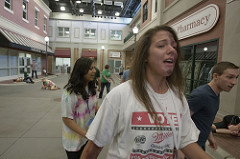

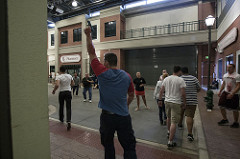
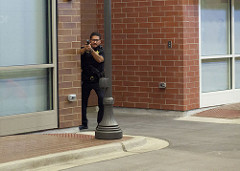

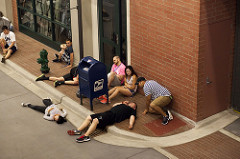
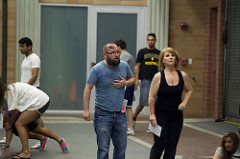
Arrrrggh! No time to comment properly!
sigh…
Suppose I am a more radical gun control advocate (whatever that means), I get why a policy that takes away most people’s guns is unpopular, and in your country unconstitutional, but why would it be wrong again*?
Let me run through an argument which would justify the more radical measure. Let’s see what you would say to that.
Unless you are an anarchist, you think the state is justified. Moreover, one of the basic functions that you think the state can legitimately perform is internal security. Clearly there are some ways in which the state may infringe your property (or more properly your holdings) or else the state could not even tax you to fund a police force. Clearly too, there are some measures which the state may not take (e.g. the patriot act) to ensure security.
One reason to suppose that taking guns away is not like spying on people’s private conversations is that whereas private conversations are not morally suspect, weapons are suspect in a way that connects up with the very justification of a state.
Weapons are not morally innnocent property, but belong to a type which is intended to inflict violence, something that is prima-facie illegitimate.
A weapon is a tool that is intended to inflict violence or the threat thereof. Even in defensive uses of a weapon, the weapon has defensive use only because it can threaten the aggressor with violence.
The precise justification for the existence of a state (i.e. an entity which maintains a monopoly on the legitimate use of force) is that the complete liberty to use force as and when you see fit would be horrible if everyone had it. The basic fact is that it is very nearly always an improvement of the state of affairs when this liberty is curtailed to some significant extent. Just thinking how far away we are from a Hobbesian state of nature in terms of our liberty to inflict violence on one another as and when we see fit and correspondingly how much better off we are as a result underwrites the justification for the state. That is to say, to say that the state in general (or in most cases) is justified just is to say that the delegitimisation of most private violence is justified.
More specifically, the delegitimisation of a given form of violence or of a given set of various forms of violence is justified if doing so reduces the overall level of violence (extent and intensity).
Given that delegitimizing private gun violence even for defensive reasons (or some kinds of gun violence) would significantly reduce overall levels of violence, said delegitimisation is justified.
If private violence by guns is illegitimate even for defensive reasons, then the government may permissibly take away people’s guns.
*PS. I’m assuming that you’ve conceded that whatever examples such advocates point to indicate that the more radical measures would actually be effective.
Murali, I apologize for asking these questions, but what do you think a republic is?
When you say just/justice, is it supposed to represent a consented justice for all people, every single one?
If the majority of violent gun aggression occurs in urban landscapes, why aren’t the defining reasons for those cases of aggression being brought into the light? Our president defined a majority of the problem as ‘angry young men’, he didn’t say anything about why those young men are angry.
Murali,
I don’t think there is anything wrong with gun control in the moral sense. There are contexts in which I would support it. Living in a city-state like Singapore might be one of them! Or an island like New Zealand… maybe (depending on how embedded guns are into their culture).
In the context of the US, though, there are a lot of reasons to own guns. More importantly, there are a lot of people that really, really want to own them. Sweeping gun control legislation might work if everyone complied, but there is every reason to believe that compliance would be a major, major issue. It has been even in blue states like Connecticut where confiscation has been tried.
Which means that we’re in the position of having to play hardball with otherwise relatively law-abiding individuals. If we play softball, then it’s ineffectual. So we have to start throwing people in jail. Mothers, fathers, sons, and daughters… and again, not even the people we are especially worried about. We’d be throwing people in jail who have not harmed anyone because we want to take away guns from them that they are unlikely to use criminally.
The result is a lot of broken eggs and we’re not sure what kind of omelette we’re making. I will concede that these laws will have some positive effect, but I have no idea how much. I suspect the biggest impact will be in the reduction of… suicides. Don’t get me wrong, that’s not nothing, but it’s also not an especially strong selling point (there’s a reason gun control advocates focus on murders).
If good laws identify criminals and bad laws create criminals, I see this as being in the latter category in the contemporary US.
I’ll add a little to Will’s comment, although he may or may not agree with my addition.
I personally believe that if, say, 99% of the guns in the US were taken/destroyed/impounded, the US would be much safer. But if only 50% or so were taken/destroyed/impounded, things would be only slightly safer, if at all. And any conceivable law that could be passed in the US would, at best, take/destroy/impound only about 10%, if that many, of the guns. At the same time, at least in the US, we’d have the constitutional problems and the other problems that come whenever we ban something that people want.
Those are made up percentages. But a “radical” confiscation policy in the US context probably won’t work on a practical level.
So, its purely a pragmatic matter for the two of you. Fair enough. That’s perhaps the only reason why I wouldn’t support a number of gun control issues in the US either.
For me, I’d say it’s almost completely pragmatic. But sometimes some measures are so impracticable that to pursue them would be almost a wrong in itself. Not that there isn’t potentially a lot that can be done, like registration or coding bullets with identifying information, and perhaps requiring owners to carry liability insurance.
I also believe in something like a natural right to self-defense, which implies in my opinion the right to legal access to some of the means of self-defense. Those means don’t have to be firearms, but in a heavily armed society, I’m willing to concede that such access is part of the right.
When it comes to hunters, I don’t have a problem with them. I don’t particularly want to get in the weeds over whether they have a “right” to their firearms (leaving aside the question of the 2d amendment) or whether it’s merely sound policy to let responsible people hunt.
I don’t have too much to say here, except that I think the ubiquitous anti-GC arguments about how these tragedies only occur because we don’t yet have enough guns being carried by enough people is equally impossible to argue against.
Quick comment, then back to work.
This is not impossible to argue against, but it is not causally countered with slogans & soundbytes.
In the interim, it takes a lot of work for me not to see the tirades of the would-be gun controllers as a form of hysteria
Well, no more hysterical than pro-gun folks get at the thought of restrictions on access. Both sides are fucking nuts!
And that’s the problem here. Folks who want increased restrictions want a society that isn’t based on fear which manifests as violence and they see the culture of guns as inherently being based on, so therefore perpetuating, fear and violence. Folks who oppose restrictions view society as something to fear and as a violent place and wants a culture that protects and promotes their right to protect themselves with guns to the fullest extent possible. (Including nukes!)
Personally, what I find exasperating is the absolutism of gun rights defenders and most definitely not the “hysterical “claims to do something about gun violence. But that’s primarily because folks who argue for absolutist positions are exasperating.
And that’s the problem here. Folks who want increased restrictions want a society that isn’t based on fear which manifests as violence and they see the culture of guns as inherently being based on, so therefore perpetuating, fear and violence.
I find myself increasingly sympathetic to to left more generally when it comes to issues of crime. In my more libertarian days, crime was one th8ng I was not libertarian on.
On this issue, though, in this context (responding to a shooting), I see it as the gun control advocates who are promoting fear. In this case, an outsized notion of the relative risk of a mass shooting. That a mass shooting of the most sensational sort is coming to a town near you unless we do something about the guns. They are taking on the role of the five o’clock news. I think it was TNR that described a moral imperative to push this violence to the general public to get their point across. If it bleeds, it leads.
I am at times uncomfortable with the pro-gun people, but every time this happens and I see that the gun control opponents go into their moral imperative, I find myself in the pro-gun defense. When advocates are citing Australia, the fears of opponents become less outlandish.
This doesn’t dictate my position on the matter, but it does influence it to the extent that I have to assume good faith in a compromise.
On this issue, though, in this context (responding to a shooting), I see it as the gun control advocates who are promoting fear. In this case, an outsized notion of the relative risk of a mass shooting.
I don’t see those arguments as emanating from any particular mass shooting, but rather that the mass shooting is a consequence of a culture deeply addicted to guns and those aspects of a culture of violence, one aspect of which is not only the fetishization of guns (and all they symbolize) as well as the second amendment, but another being the reverence of guns as symbols of power and the veneration of powerbased solutions. Seems to me anyway. Course, even if any of that were correct it doesn’t resolve what’s seems like an intractable disagreement.
Well, it comes up after almost every individual mass shooting. It typically invokes all of them. But “all of them” are not something to be actively feared. If you go to the theater fearing that some gun man is going to come in and shoot the place up, you have bad risk assessment skills.
This applies to individuals who insist on the right to carry a gun into the theater “just in case” but also applies to those who use these shootings as a cornerstone in justifying far-reaching changes in gun laws*.
I disapprove of both, but to the extent that there is a difference between the two, one is doing something on his own volition and the other is demanding collective action**.
*- Yeah, there is some foot-shifting that it’s not actually about these shootings, but these shootings are what is being used. The (often shady) statistics of these shootings are used in service of the argument (Gun violence is down, but these shootings are up! Fear! Fear! Fear!).
** – Excluding those gun rights advocates who seek to pass laws to force establishments to allow guns into their theaters. They are categorically more similar to the first group and disapprove to a greater extent than I do the second group***.
*** – In another universe, I would be standing with gun control advocates in opposing these sorts of laws as an overreaction and poor risk assessment. I end up directing my attention to the other side because the bright line is drawn, and I oppose Australian and/or British gun laws more than I oppose these measures.
This may, or may not, be funny:
Yeah, this has become one of the go-to when this sort of thing happens. I saw it at least a couple dozen times on Twitter, and maybe a half-dozen on Facebook.
I have the vague hope that it will be used in lieu of yelling. “Sigh. Here’s that Onion article. You know the drill. I’m hungry.”
Both sides are dishonest & absolutist, which is what causes the trouble.
No time to expand on it, but here’s is something to think about:
GC advocates would get more traction with the general population if they offered a tangible hope.
In what way are gun control advocates absolutists? I don’t see that. Maybe we’re each using the word differently?
Absolutist in the sense that what they really want is UK/Australia type confiscation.
I will flesh out my argument for this as soon as I can, but it’ll be a few weeks.
I am just gonna leave this here:
http://www.beliefnet.com/News/Articles/Harvard-University-Study-Reveals-Astonishing-Link.aspx?p=1#CZtrxm2XgWDkPsFV.99
Furthermore, it really boils down to how one views society. Is this something a modern society should have, or not.
So, I will leave this here:
http://www.thepolemicist.net/2013/01/the-rifle-on-wall-left-argument-for-gun.html
Here’s one area we may differ on this Aaron: if we accept that a rifle on the wall is a symbol of democracy, does it follow that concealed carry is also a symbol of democracy? Or that open carry is a symbol of democracy Or that expressing the right to bear arms by protesting while carrying rifles, shotguns and pistols is? Or that advocating, as a solution to massacres and other gun-related crime, is for more people to carry is?
My guess, and it’s only a guess!, is that we disagree about what that rifle on the wall actually symbolizes.
Hmmm, I think that it is an educated guess! I didn’t write that, that latter bit, but I do think it is interesting. And I don’t agree with everything in it (I think, I read it a long time ago…) but that it expresses things that I overall agree with. I personally don’t carry a gun, nor do I have any interest in doing so. I think that CC for many symbolizes how much trust they feel that the gov’t should allow them, and at the same time how much agency they may have in dealing with the protection they subscribe to. And as such, for them, yes it does sybolize democracy, as does carrying a rifle/shotgun to a demonstration for the above.
It doesn’t to me, but moving from what I see as your arguement, the possibility of doing so becomes necessary for some. Much like freedom of speach, in my eyes you don’t have freedom of such if someone was to say “but you can’t say THAT.”
That said, I would need to know what you saw that rifle on the wall as symbolizing. I could guess, but…